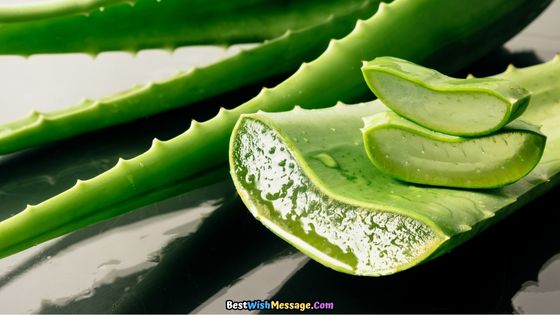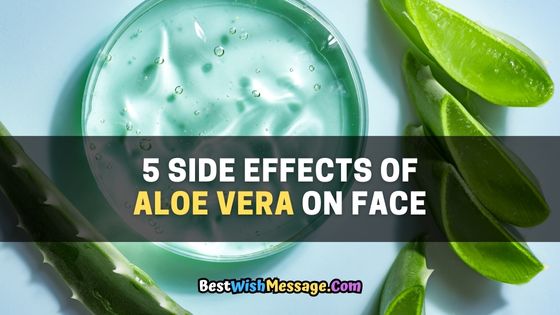Aloe vera is often hailed as a miracle plant for skincare, but did you know it may not suit everyone? While it’s known for its soothing and hydrating properties, improper use can lead to unexpected side effects on the face.
In this blog, we’ll uncover five potential downsides of aloe vera for facial care. Stay informed to ensure your skincare routine works wonders without causing harm!
Side Effects of Aloe Vera on the Face
1. Skin Irritation and Allergic Reactions
Although aloe vera is known for soothing skin, it can cause irritation or allergic reactions in certain individuals. This usually occurs due to the presence of anthraquinones like aloin, compounds that might be too harsh for sensitive skin.
How It Happens:
- Individuals with sensitive or reactive skin may experience redness, itchiness, or burning sensations after applying aloe vera.
- The plant contains natural enzymes and compounds that can trigger dermatitis in rare cases.
- Reactions are more likely with fresh aloe vera directly from the plant as opposed to processed products that are formulated for sensitive skin.
Precautions:
- Perform a patch test by applying a small amount to the inside of your wrist or behind the ear.
- Use aloe vera products designed for sensitive skin, which may lack irritating compounds.
- If irritation occurs, rinse off immediately and apply a soothing cream.
Why This Matters:
While aloe vera is often touted as hypoallergenic, the presence of certain natural compounds can still cause issues for people with skin sensitivities or allergies. Always check the product label for potential additives that might exacerbate the reaction.
2. Dryness or Overhydration
Ironically, while aloe vera is renowned for its moisturizing properties, excessive use may lead to the opposite effect—dryness. This paradoxical reaction often surprises users expecting aloe to only hydrate their skin.

How It Happens:
- Aloe vera contains natural astringent properties that can strip the skin of its natural oils if overused.
- Prolonged use may disrupt the skin’s natural moisture barrier, leading to dryness or flakiness.
- For individuals with already dry skin, this effect can worsen the condition.
Precautions:
- Limit aloe vera application to once daily or every other day, especially if you notice dryness developing.
- Pair aloe vera with a good-quality moisturizer to maintain hydration levels.
- Avoid alcohol-based aloe vera gels that exacerbate dryness.
Why This Matters:
While aloe vera is considered a go-to remedy for dry and irritated skin, understanding its drying tendencies when overused can prevent further complications. Moderation and proper layering of skincare products are key.
3. Photosensitivity
Aloe vera can increase your skin’s sensitivity to sunlight, leading to a higher risk of sunburns and pigmentation issues. This side effect is particularly concerning for people with fair skin or those who spend extended periods outdoors.
How It Happens:
- Aloe vera enhances the absorption of ultraviolet (UV) light, making your skin more prone to sun damage.
- Compounds in aloe vera may interact with UV rays, causing irritation or hyperpigmentation.
- Using aloe vera products with added fragrances or preservatives can amplify this effect.
Precautions:
- Always apply sunscreen with SPF 30 or higher when using aloe vera on your face.
- Use aloe vera at night instead of during the day to minimize sun exposure.
- Avoid combining aloe vera with photosensitizing ingredients like citrus oils or retinol.
Why This Matters:
Photosensitivity can lead to long-term skin damage, including premature aging and pigmentation issues. Understanding how aloe vera interacts with UV light is essential for safe use in your skincare routine.
4. Acne Flare-Ups
Aloe vera is often promoted as a remedy for acne due to its anti-inflammatory properties. However, in some cases, it may worsen acne or trigger new breakouts.

How It Happens:
- Aloe vera gels often contain added ingredients like alcohol, fragrances, or preservatives that clog pores.
- Overuse of aloe vera can disrupt the skin’s pH balance, leading to an increase in acne-causing bacteria.
- For people with fungal acne, aloe vera’s sugar content can feed the yeast, exacerbating the condition.
Precautions:
- Opt for pure aloe vera gel without additives to minimize pore-clogging risks.
- Avoid applying aloe vera on active, open acne lesions to prevent irritation.
- Monitor your skin’s reaction closely and discontinue use if breakouts worsen.
Why This Matters:
Although aloe vera can work wonders for some acne sufferers, understanding its potential to aggravate certain types of acne can help users make smarter choices.
5. Interference with Healing
While aloe vera is known for promoting wound healing, excessive or incorrect use may actually delay the process. This is especially true for deeper cuts, burns, or sensitive areas on the face.
How It Happens:
- Aloe vera forms a protective layer on the skin, which, if applied too soon, can trap bacteria in wounds.
- The natural enzymes in aloe vera may irritate healing skin, causing redness or delayed closure of wounds.
- Applying aloe vera too frequently can soften scabs prematurely, hindering the natural healing process.
Precautions:
- Use aloe vera sparingly on open wounds or fresh scars, and only after consulting a dermatologist.
- Opt for medical-grade aloe vera products for wound care to avoid contamination.
- Discontinue use immediately if you notice increased redness, swelling, or delayed healing.
Why This Matters:
Although aloe vera is widely recognized for its healing properties, improper use can have the opposite effect, especially for those with delicate or injured skin.
While aloe vera has many benefits, it’s essential to know its side effects too! 🌿✨ Always do a patch test to keep your skin safe and glowing. 🌸 Stay informed, stay beautiful! 💖 #SkinCareTips
